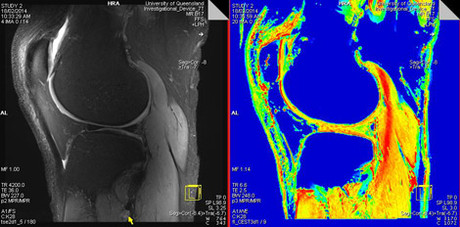Southern Hemisphere's Most Powerful Body Scanner Now Operating at UQ
Thursday, 13 March, 2014

 The Southern Hemisphere's most powerful body scanner, capable of capturing extremely fine anatomical details, is now operating at The University of Queensland.
The Southern Hemisphere's most powerful body scanner, capable of capturing extremely fine anatomical details, is now operating at The University of Queensland.
UQ’s Centre for Advanced Imaging Director Professor David Reutens said the $11m 7T scanner provided unprecedented opportunities for imaging research in Australia.
“It will benefit important research programs into neurodegenerative diseases such as Alzheimer’s and Parkinson’s disease, and disabling diseases such as arthritis,” he said.
Funding for the scanner was provided under the Federal Government’s Educational Investment Fund.
Centre for Advanced Imaging Research and Technology Director Professor Ian Brereton said the Siemens Healthcare MAGNETOM 7T scanner’s ultra-high field strength could measure tissue metabolism non-invasively at a spatial resolution not previously possible.
The 7T is a flagship instrument of the National Imaging Facility, a research network of 10 Australian universities and the Australian Nuclear Science and Technology Organisation, with more than $150m worth of imaging infrastructure.
The 7 Tesla research program is headed by Associate Professor Markus Barth, who has joined The University of Queensland from the Donders Institute for Brain, Cognition and Behaviour in The Netherlands.
The scanner builds on UQ’s strong record in magnetic resonance technology and engineering and is an opportunity for scientists and engineers in Queensland and beyond to play a significant role in the next generation of medical technology.
AdPha welcomes "win for all Australians" PBS news
Advanced Pharmacy Australia has welcomed the announcement that over 400,000 Australians each week...
NSW sees ramping reductions across some of its busiest EDs
Some of NSW's busiest emergency departments have seen significant reductions in hospital...
RACGP calls for obesity-management medication PBS subsidy
Following its new position statement on obesity prevention and management, the RACGP is calling...









